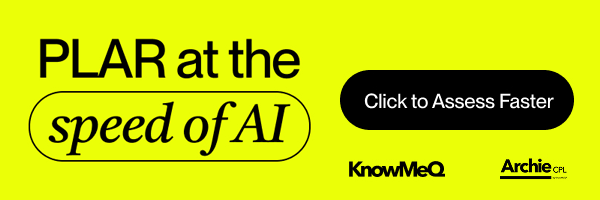First-of-its-kind equitable assessment tool fills gap in the ed tech and speech-language market, supporting early intervention for those who need it and avoiding mislabelling of those who don't
Education expert Anne Laurie was a young research assistant when she first discovered a big inequality in the way Canadian children are assessed for Developmental Language Disorder. Now, as a postdoctoral researcher and founder of Fredericton-based startup TRICOAST Education, she's on a mission to bring inclusivity to language assessment with a first-of-its-kind equitable tool she developed to ensure children who need early intervention get it and those who don't avoid being mislabelled.
The innovative work has earned Laurie a Mitacs Innovation Award Inclusive Innovator of the Year, awarded by Mitacs, a leading innovation organization that connects businesses and researchers with unrivalled access to talent, financial support, and the partnerships needed to turn ideas into impactful innovations. The award will be presented at a ceremony at the National Arts Centre in Ottawa on November 17.
Laurie a Concordia University postdoctoral researcher in the Department of Education (Child Studies) under the supervision of Professor Diane Pesco is being recognized for her work to advance a novel Curriculum-Based Dynamic Assessment (CBDA) tool that is filling a gap in the speech-language and ed tech markets. The tool, now offered on an online platform through TRICOAST Education, is the first of its kind to provide a culturally sensitive way to distinguish between language difference (characterized by an accent or a second language) and Developmental Language Disorder (genuine difficulty in understanding or using language).
"What people don't realize is that when you have Developmental Language Disorder, you're going to have it in all of your languages, not just in the one you are learning," said Laurie. "Right now, we don't have an effective way to accurately identify students who are struggling to speak English or French not because it's a language difference, but because it's a language disorder."
The CBDA tool is currently being piloted in francophone schools in Ontario and by speech language pathologists in Quebec, France and Belgium. TRICOAST Education provides necessary training on how to use the dynamic assessment, either by video or in person, and is in the process of creating training modules to reach an even wider audience.
"I'd love to see this assessment used in every school in Canada," said Laurie, who credits Mitacs for enabling her to rapidly scale her product and business. "Mitacs's support allows me to have one foot in research and one foot in practice simultaneously. If I didn't have Mitacs, it would have taken me a lot longer than six years to get here," she said.
The problem with current language assessment tools, she explained, is that they are typically validated on white, middle-class populations. When used with children from different lived experiences and languages including those from Indigenous or immigrant communities they often don't perform well due to inherent bias. As a result, students are either overlooked or are wrongly diagnosed with Development Language Disorder. This situation can leave children struggling for years without needed support, or cause undue stress on families and strain on speech-pathology resources.
"Current language assessments are wonderful for English-speaking, western background children, but there are entire populations for which they are ineffective," said Laurie, who saw the inequity firsthand while assessing First Nations students for literacy and language, as well as in New Brunswick's public school system where she witnessed teachers struggling to properly assess the language skills of an influx of Syrian refugee students in 2016.
"When standardized language assessments were applied in First Nations communities, schools were identifying as much as 75 to 80 percent of their entire student body as having Developmental Language Disorder, which isn't realistic," said Laurie, noting that the actual number is closer to 7.5 percent, or one in 14 children.
Unlike traditional assessments that measure a child's language abilities at a specific point in time against the performance of a norming group' of English speakers, Laurie's CBDA looks at a child's potential to learn. Using storytelling, the CBDA focuses on how a child learns with support, rather than how fluent their language is. Children are shown a picture and asked to tell a story about it. The examiner first observes how they organize and express their story, then guides them through a teaching phase to see how they respond to feedback for example, by improving the story's beginning or ending, adding more action, or describing characters more vividly.
The online platform automatically calculates whether the child is at risk for Developmental Language Disorder and steps towards targeted intervention and provides an easy-to-digest report that can be shared with educators and parents.
"One of the reasons I picked storytelling as a task is because it's so rich in language and there's culture wrapped around it," said Laurie. "You have to be taught how to read, but storytelling is innate in all of us."
The Mitacs Innovation Award Inclusive Innovator of the Year celebrates research achievements that promote social inclusion, incorporate diverse perspectives, and prioritize accessibility in the design and execution of innovative projects, products, and services. Mitacs programs are supported by funding from the Government of Canada and provincial and territorial governments across the country.
Laurie is one of 11 Mitacs award winners nationally, nominated from a pool of thousands of researchers who take part in Mitacs programs each year. Additional 2025 award categories include: five winners for Outstanding Innovation, two winners for Research Leadership, two winners for Canadian Start-Up Innovator of the Year, and Canadian Enterprise Innovator of the Year.
In congratulating the winners, Mitacs CEO Dr. Stephen Lucas reflected on the importance of innovation talent in shaping Canada's future. "At a time when we need to build a stronger and more resilient economy, these eleven innovators and organizations demonstrate what's possible when we invest in ideas, talent, and innovation," Dr. Lucas said.
For more information about the Mitacs awards and a full list of winners, visit www.mitacs.ca/newsroom.









